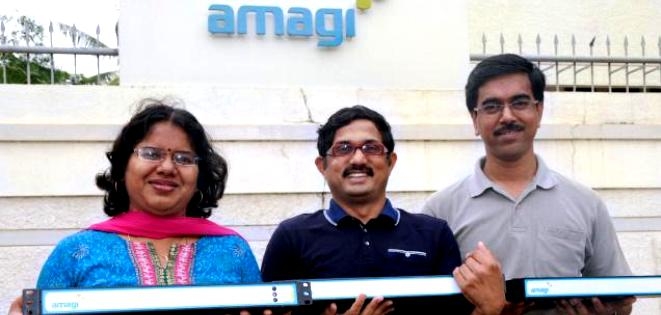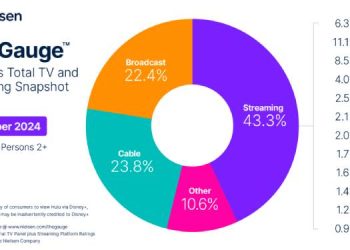
Bangalore : Imagine two viewers, one in Mumbai and the other in Hyderabad, watching the same programme on the same TV channel but seeing two different advertisements at the same time.
Making this possible is Amagi Media Labs, a Bengaluru-based company engaged in geo-targeting of television advertisements. Amagi, touted as the country’s largest TV ad network, helps advertisers geo-target (also called as adversioning in advertisement parlance) their campaigns on TV.
It buys advertising spots nationally from channels like Zee TV and IBN7 and splits them across these regional markets. Under this model, an advertiser can buy a 30-second advertising spot on a channel only for a particular city or region, at a fraction of the national rate.
K A Srinivasan, Baskar Subramaniam and Srividhya Srinivasan – classmates in college and colleagues at Texas Instruments – floated Amagi in 2008, starting with its incubation at Nadathur S Raghavan Centre for Entrepreneurial Learning (NSRCEL) of Indian Institute of Management Bangalore.
Prior to Amagi, the trio had co-founded Impulsesoft, a company specialising in wireless audio technology, acquired by Sirf Technologies in 2006.
“The idea behind floating Amagi was to revolutionise broadcasting and TV advertising. While other media like print, radio, digital and outdoor had geo-specific advertising, TV was national. On the one hand, TV is the most effective medium for mass communication. It is also extremely expensive. You could either advertise nationally, or you couldn’t advertise at all,” said co-founder Srinivasan.
Amagi’s vision was to change this and combine the targeting power the Internet provides with the massive reach of television. The proliferation of digitisation in the TV industry has made it possible to segment and target audience effectively even on TV, he adds.
“Our approach to start the company was rather clinical. The idea was born out of a brainstorming session and validated through research, both qualitative and quantitative. The advertisers we spoke with loved the idea. A platform that could combine reach with targeting is every marketer’s dream and we saw tremendous enthusiasm for the concept,” says Srividhya Srinivasan.
Marketers like Vini Cosmetics are indeed happy with Amagi’s patented technology platform, being used in five continents by TV networks. “We have found Amagi to be a force multiplier for our advertising. Geo-targeting helped us focus our budget on the most important markets and consequently drove optimal returns on our marketing investment. Amagi’s geo-targeting is a game-changer and heralds the future of TV advertising,” says Deepam Patel, director, Vini Cosmetics Private Limited.
Amagi’s US-patented watermarking technology is the backbone for its geo-targeted advertising service. This was built in-house by the team lead by Srividhya Srinivasan. Put simply, the technology overlays a signature/watermark on the video (TV commercial which needs to be replaced), then detected at the satellite receivers at MSOs (multiple system operators) and replaced with the regional ad.
Business dynamics
Adversioning (or cable spot advertising as it is known in the US) is a Rs 33,000-crore market in the US and is also fairly popular in Europe and Korea. The geo-targeted advertising market in India, which is still in a nascent stage but expected to see an exponential growth in the next four to five years, is currently pegged at Rs 6,500 crore. Rediff’s Vubites and Star India’s Adsharp are the other players that recently plunged into the geo-targeted advertising arena. According to Baskar Subramaniam, co-founder of Amagi, the company already has at least 2,500 brands, including large corporates like P&G, HUL, ITC, Dabur and GSK, advertising on its platform. Currently, Amagi is present in over 15 countries. Outside India, it provides its technology to TV networks to enable them to deliver targeted ads or content.
“Over the last few years, we have served over a total of 30 million ad seconds. Today, we handle close to a million ad seconds a month. We expect to see a multi-fold growth in the next couple of years,” Subramaniam adds.
Early this month, Amagi raised undisclosed funding from its existing investor Mayfield (their second round) and PremjiInvest, the family office of Wipro Chairman Azim Premji. Prior to this, the company had raised Rs 68 crore from Mayfield and Nadathur Holdings, the family office of Infosys co-founder N S Raghavan.
“The deployment plan for these funds is to expand our channel bouquet and sales and marketing in India, besides expanding our global footprint. Also, the company intends to grow its team to 160 by the end of FY16, from the current 110,” says K A Srinivasan. Declining to disclose the company’s annual revenue figures and give any projections either, he said the company has grown in excess of 300 per cent from last year.

















